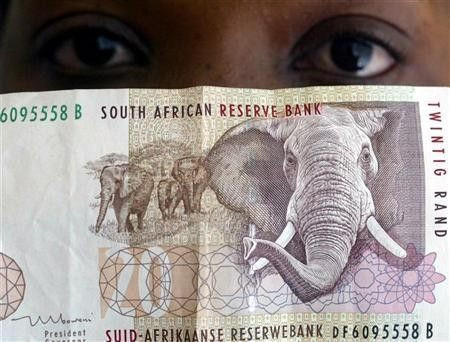S.Africa's bonds shine, global worries weigh on rand, stocks

South African government bonds rose on Tuesday, boosted by an auction which saw the strongest demand in a year with foreign buying a key feature.
Local shares and the rand weakened, falling victim to a re-emergence of worries about the debt crisis in the euro zone, which had taken a back seat to U.S. debt talk in the past two weeks.
Stocks hit five-week lows, falling more than one percent while the rand inched very close to the 6.80/dollar, a key level that would signal further losses if broken convincingly.
Yields on government bonds touched multi-month lows across the curve, after a strong weekly auction.
The yield on the 2015 bond hit a session low of 7.19 percent -- its lowest since January 5 -- before coming back to 7.21 percent, three basis points down from the previous close.
The 7.20 level is key for the 2015 bond and should it be pierced with conviction, the next support will be at 7.05 percent, last seen in late 2010.
The 2026 yield was down eight basis points from Monday's close at 8.315 percent, after falling to 8.29 percent earlier, its lowest since November 2010.
"It looks like foreigners still have decent appetite for local bonds," said Ion de Vleeschauwer, chief dealer at Bidvest Bank.
"Yields are still attractive and it doesn't look like there's space for interest rates to pickup in both the euro zone and the U.S, so that's supporting local bonds."
The sluggishness in the global economy has left little scope for tightening monetary policy, with the Bank of England and the European Central Bank both expected to leave rates unchanged this week.
On the foreign exchange market, the rand was trading at 6.75 to the dollar at 1540 GMT, 0.44 percent weaker than Monday's New York close of 6.7230.
The rand's near-term outlook is mixed.
"The global backdrop should continue to offer the dollar/rand momentum, and if eurozone woes deepen, the pair could be knocked back up to range highs," said Anisha Arora, junior emerging market analyst at 4CAST.
Some analysts said investors should however be wary of expecting sharp losses in the rand because inflows into the bond market are likely to support it.
STOCKS HIT
On the bourse, the JSE Top-40 blue-chip index was off 1.37 percent at 27,523.75 and the broader All-share index surrendered 1.23 percent to 30,871.78.
"The debt deal is a positive but now the guys are looking are growth prospects, which seem limited if one looks at the data that just came out," one Johannesburg-based trader said.
Industrial metal miners fell as demand worries pushed copper prices to one-week lows. Kumba Iron Ore led the decliners' list on the blue chip index, falling 4.69 percent to 503.42 rand, the biggest daily percentage decline in 4 1/2 months.
Elsewhere, Massmart, a retailer controlled by Wal-Mart, dipped 0.86 percent to 144.73 rand.
South African government said it would push Wal-Mart to re-jig the conditions of its $2.4 billion Massmart deal, as Pretoria looks to wring bigger concessions from the world's top retailer.
But gold miners capped losses on the bourse, boosted by higher bullion price and as workers ended a crippling pay strike. For details on the strike, double click on
Harmony climbed 4.6 percent to 96.50 rand, Gold Fields added 2.16 percent to 107.99 rand and AngloGold Ashanti was up 1.62 percent at 290 rand.
In earnings news, Absa was up 0.8 percent at 134.01 rand after posting above-forecasts first-half profit.
© Copyright Thomson Reuters 2024. All rights reserved.




















